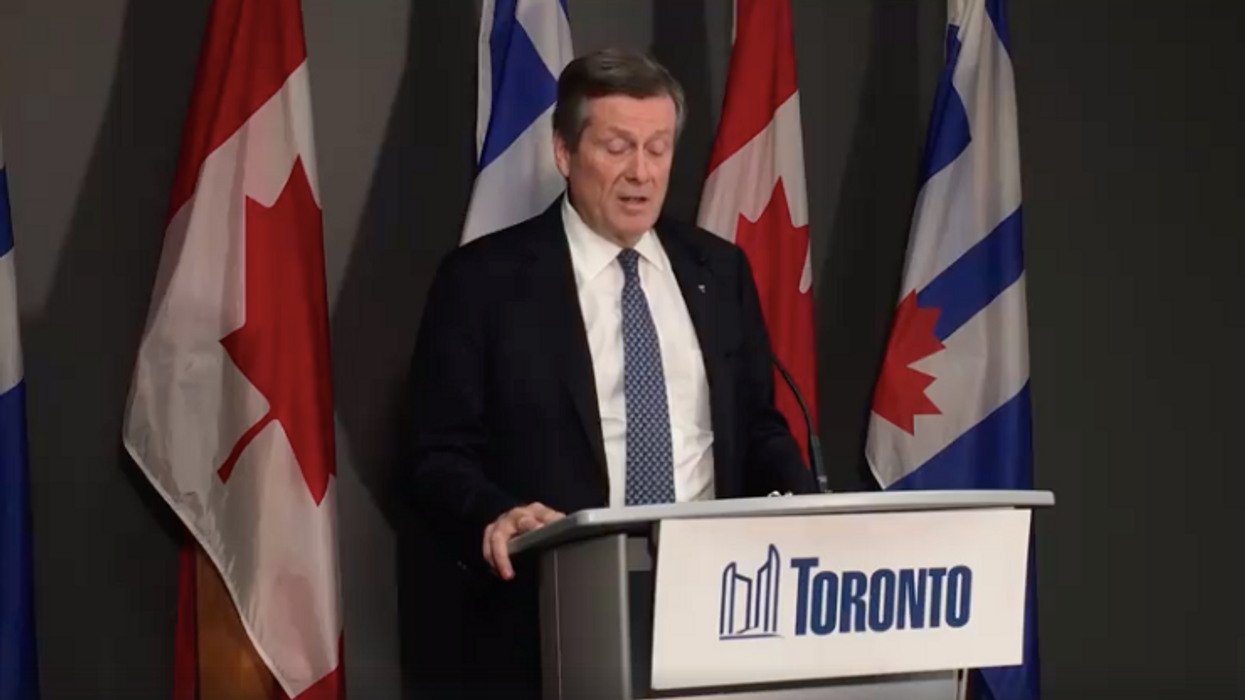The controversial Ontario Line transit plan chugs on – but serious questions and obstacles remain.
This week, Toronto city council officially approved the Ford government’s proposal for the tunnelled and elevated line whose purpose is to help reduce current and projected congestion downtown.
The Ontario Line, first introduced earlier this year in the provincial 2019 Ontario Budget, runs a similar route to the Relief Line (favoured by Toronto). When completed, it will feature 15 stations, connecting the Exhibition GO station to Line 5 at Don Mills Rd. and Eglinton Ave. East, near a new Science Centre station.
The newly elected Justin Trudeau Liberal government in Ottawa officially backed the line a few weeks ago during the election campaign, so all three levels of government are now on board.
READ: TTC Subway Stations To Stop Selling Tokens, Tickets And Day Passes
The council vote Tuesday was 22 to 3 in favour of the project. Mayor John Tory labelled it a “good deal” for Toronto.
“We owe it to people who live in Toronto now and those who will live here going forward to expand our transit infrastructure and keep our existing system in a state of good repair,” said Tory.
Ford said he’s “proud that Toronto City Council voted to fully support our government’s proposed Ontario-Toronto Transit Partnership to advance Ontario’s priority subway expansion program, including our signature project the Ontario Line.”
The deal brings with it close to $30 billion in new transit investment for Toronto. It also guarantees that the current TTC transit system remains owned and operated by the city.
Still, it’s no secret that Toronto has long preferred the Relief Line. And despite the approval, the Ontario Line still has doubters, such as Councillor Mike Layton.
READ: TTC Expands Discount Program To Make Public Transit More Accessible
“The Ontario government has given Toronto a false choice on transit,” said Layton.
“They are telling us to stop current transit expansion plans, accept years of delay on new Scarborough transit and accept a plan with limited information. The alternative – don’t get anything.”
The Ontario Line is forecast to cost $10.9 billion to build, with an expected completion date of 2027, which is two years sooner than the proposed accelerated Relief Line South.
The Ford transit plan also has supporters.
"I think the Ontario Line is full of potential," Councillor Josh Matlow said Monday. "It's exciting. The way that it's extended and expanded past what the relief line vision was is terrific."
READ: Here’s What The Brampton-Mississauga Hurontario LRT Line Will Look Like
But like many others, Matlow still shares concerns about unanswered questions such as logistics, technology, route alignment, and feasibility.
Matlow added: "This is the problem with how transit is often done in Toronto and Ontario," he said. "Big announcements are made and then they do reality checks later."
And exactly how much will it cost the city in operating costs in the years to come? That worries Steve Munro, a Toronto transit expert.
"Sure, that's eight, 10 years down the future,” Munro told The CBC. “But what are we getting ourselves on the hook for in terms of future costs?"
Ben Spurr, the Toronto Star’s transportation writer, this week quoted Shoshanna Saxe, an assistant professor at the University of Toronto’s department of civil engineering as saying that whatever the benefits of the deal, approval by the city would represent “yet another time where Toronto changed its mind and backtracked on transit planning.”
READ: Brampton Transit Improves Links To The GO Train
Saxe went on to point out that a city assessment found that the Ontario Line project has potential benefits and could improve the transit network, but described the project as being at a “conceptual” phase and cautioned it “may change significantly” as design is refined.
Spurr also quoted Steven Farber, a transportation geographer and assistant professor at the University of Toronto Scarborough who told Spur that just because the province is footing the bill for the projects doesn’t mean they’re wise investments for the city.
Writing on Twitter, Spurr also pointed out that the "TTC confirms projected capacity of relief line would be 44,000 ppl per hour. Ontario Line, which would use smaller trains, would be 34,000 ppl per hour."
Obviously, the Ontario Line project has a long, hard route ahead.





















